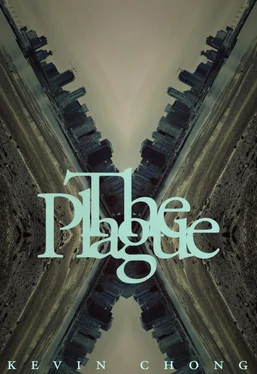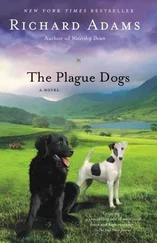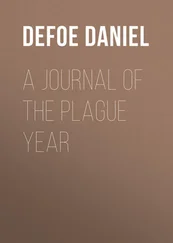Our next witness, Raymond Siddhu, offers insight into the city’s power structures and communities. As a reporter, he also had a pretext to interview and collect impressions from an assortment of people. For the sake of simplicity, we begin Siddhu’s story the same day as Rieux’s. That day commenced with his commute.
Siddhu preferred to take public transportation into the city, departing before rush hour began. In such fashion, he could leave the car for his wife, Uma, who had another two months of maternity leave, and be out of the house before his twin boys, Ranjeet and Ravinder, woke each other up. This morning, Uma was still sleeping; she’d stayed up late, sewing together Halloween outfits for their ten-month-old babies. In Siddhu’s mind, they already attracted too much attention, but his opinion, he was beginning to discover, counted for nothing. The boys would go trick-or-treating as salt-and-pepper shakers.
In the winter, taking the bus entailed stepping outside when the sky was still cobalt blue. The bus—and later, the SkyTrain—meant fifty-five minutes of enforced inactivity. Reading or checking email on his phone while in a moving vehicle turned his stomach. Eating or drinking was prohibited. Occasionally he would listen to streaming music or a podcast, but finding new music and podcasts was a part-time job in itself. The calm of the bus ride allowed him to rest before he launched into a work day that often left him both exhausted and buzzing. His job had always involved deadlines and compromises, but the latest round of buyouts and cuts at the newspaper induced stress hives. He’d already covered the health and city hall beats; the September workforce reduction brought op-eds into his portfolio. At least he now had a window-facing cubicle. And at the morning story meeting, he could find blueberry muffins. A perk, right? The fruit-stained fingertips of a laid-off staffer flashed before his eyes.
The newsroom meeting was brisk and uneventful as the editor-in-chief’s rundown of top stories went unquestioned. Siddhu was asked to discuss his story about a clinic on the edge of an area contentiously known as the Gastown Annex; the doctors there had put a priority on treating patients who’d been displaced by the development. Siddhu got the sense that he was going on too long. Everyone seemed impatient for the day to proceed. Among a boardroom full of people who prided themselves in declaring every bit of news a poor copy of something that happened ten years earlier, there was an anxious energy surrounding an afternoon visit by Romeo Parsons.
The newly elected mayor had the heady glamour of a movie star, despite his near-sightedness and fluency in rezoning policy. The staff at Siddhu’s workplace prized neutrality, but the swooning could not be concealed when his name was uttered in passing. Newspaper sales, stagnant though they were, rose to 2007 levels whenever his face appeared on its front page. Siddhu did not trust Parsons but would never have voiced his skepticism. It would have been a singular shame in the office to have admitted voting for the incumbent. Luckily, he lived outside city limits.
At his new desk, he reviewed a press release from the clinic, which had introduced an outreach worker to find patients pushed out by the Annex. The phone started to ring. He initially ignored it, thinking the call was for the desk’s previous occupant, who was currently in a guest house in Mexico on an indefinite vacation. He checked the caller ID and recognized the name: Elliot Horne-Bough, the young owner of a popular news website, GSSP. The site had repurposed a few of his buzziest stories, leaving out his byline, to whip up their own internet traffic.
Horne-Bough told Siddhu that he wanted to meet with him, which Siddhu interpreted as a peace offering. He declined.
“How about instead of an apology, I hire you?” Horne-Bough said. “Sorries are for suckers.”
“I already have a job. And I need to go.”
“Okay, but I am persistent. I don’t want you to work for me. I want you as a partner. Remember that: I am persistent. ” Siddhu hung up.
As the afternoon approached, LED camera lights were installed in the front foyer for photos with the new mayor. Women came back from lunch wearing more makeup, and men who lived in wrinkly button-downs had covered them with blazers. Siddhu kept a bottle of mouthwash in his drawer and wondered whether he should pass it around before he took the elevator downstairs.
Outside it was spitting rain. A handful of blocks separated his office in the city’s financial centre from the Annex. He sidestepped the tourist shops in Gastown selling replica totem poles and Canadian flags and barrelled along the Annex’s cobblestoned pedestrian thoroughfare. Siddhu’s last meal out with Uma had been in the summer at one of the new sidewalk cafés. Coloured lights had been strung between the four-storey buildings over the thoroughfare, and he felt like he was in Europe. Now he missed the balmy weather if not the solicitous gastropub owners and sushi slingers hoping to entice him onto their patios.
The clinic sat at the end of the development, around suspiciously charred buildings that were now weeks away from demolition. He stepped foot inside the waiting area to sounds of coughing and told the receptionist about his appointment. “Our new counsellor called in sick—at the last minute,” she told him, too harried to be apologetic. “Dr Rieux has offered to speak to you.”
Siddhu agreed, knowing it was his best chance to avoid Romeo Parsons, and was sent back to the waiting area. None of the magazines on the table had been published within the past three years. Most of the waiting patients wore headphones and sat slumped on their chairs. One woman held a child on her knee. She was trying to comfort the boy who was no older than six years old, and held his own elbows as though he ached everywhere else. The mother seemed to think the child needed to be cajoled out of his pain, her admonishments delivered in singsong syllables. The boy grimaced but held back his tears.
Since Siddhu had become a father, he’d lost the ability to throttle his emotions. Once he could clench his mouth into a mask of calm; now the feelings bubbled onto his face. Siddhu knew that when his eyes began to water, soon he would be bawling. Just a month earlier, both of his babies had gone into anaphylactic shock after they’d first tried eggs. He remembered the step-by-step hurry of bundling the boys and latching them into their car seats, and his wife snarling at him because a strap was twisted. He remembered driving to the hospital in pyjamas, the headwind of paperwork at admissions, and then the wait.
Siddhu felt the yo-yo in his pocket. When the boy’s glance landed in his direction, he flashed the silver Ricochet in his closed palm and slung it out. Then he stood up, threw the yo-yo behind him, and brought it up so it looked like he was walking a dog. He’d been given a yo-yo as a child but had only renewed his fascination in the last six months. The yo-yo he owned was an indulgence and aspirational purchase; it was made for professionals and produced a pleasant ratcheting sound as it unwound. He brought the toy up to his chest, flung it down, and separated his hands to recreate the trick he’d seen online. The boy’s expression settled, and his mother quit chirping and smoothed the hair on the back of his head.
Dr Rieux appeared. He was a short man who wore his hair in a bouquet of wiry brown curls. He had a Mediterranean complexion but his eyes seemed to have some East Asian provenance. When he saw Siddhu’s tears, he instinctively shrank back. Siddhu snapped the yo-yo back into his hand.
“I’m about to take a coffee break,” the doctor told him. “Do you want to come with me?”
Everyone in the crowded waiting room watched him bounce out. The doctor was indifferent to their looks of impatience and disappointment. Rieux was arrogant—like many doctors Siddhu had met. “It’s been crazy all week. There’s a flu in the neighbourhood,” the doctor told him. At the corner coffee shop—a place Siddhu would later describe as a “Scandinavian coffee laboratory”—Rieux told him to order a twelve-ounce latte. Siddhu followed his command, even though he usually took his coffee black, then Rieux led them to a set of stools by the window.
Читать дальше












